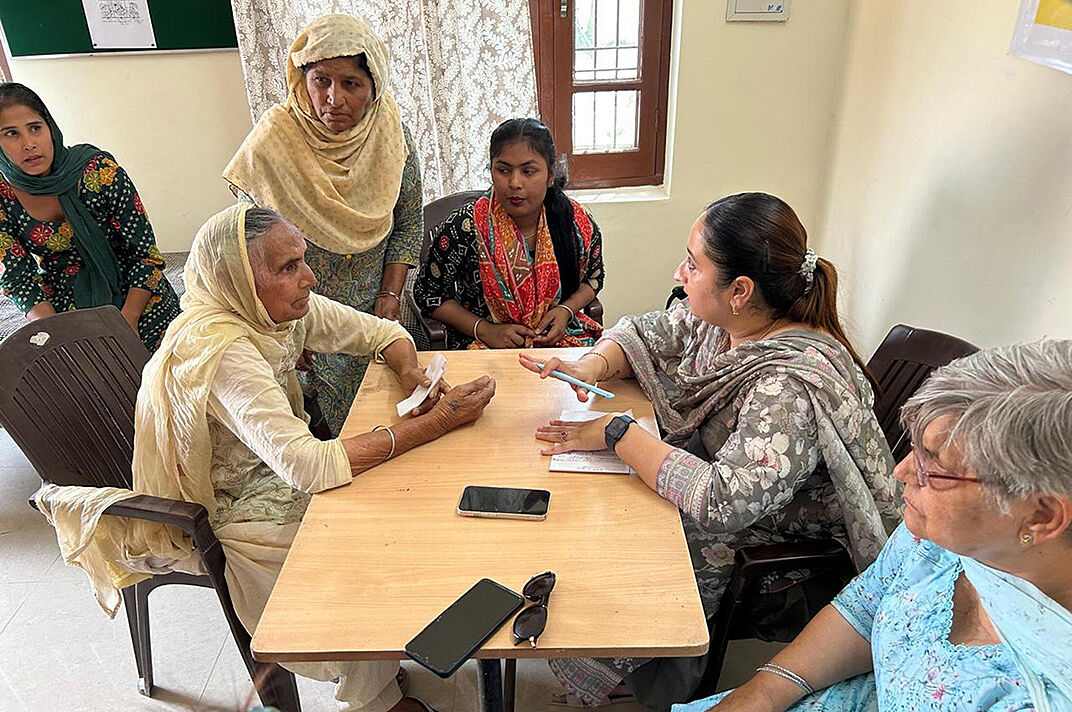Evangelische Bank eG
IBAN: DE85 5206 0410 0000 0001 24
BIC: GENODEF1EK1
India: Healthcare
India is the world's fastest growing major economy. While part of India's population participates in the growing economic prosperity, another part does not. India is a country of inequalities. One look at the healthcare system is sufficient. On the one hand, there are cities with 5-star hospitals and then again there are rural areas where state healthcare facilities are barely accessible. The Dalits, members of the lowest social caste, suffer especially from this disparity. The Church of North India (CNI) has therefore launched a project to provide Dalits in the state of Punjab with access to basic healthcare.
The state of Punjab is situated in the north west of India. According to a study conducted by the University of Chandigarh, the number of HIV/AIDS cases in this region rose sharply in 2021-22. Tuberculosis, drug addiction and alcoholism are also widespread. The healthcare system fails to provide its services throughout the region. The CNI is therefore setting up a healthcare network in villages in the region bordering Pakistan. In the past, the villages were neglected especially when it comes to healthcare.
The church is organising community events to inform children, young adults and adults about diseases such as AIDS and tuberculosis, thus ensuring greater acceptance and awareness among the population. Medical camps, which are small mobile health clinics, offer regular preventive screenings. This is vital since early detection helps mitigate the effects of a disease. A mobile outreach service encourages people to take up the offer and provides full palliative care in the event of illness.

India
Around 70% of India's rural population has little access to healthcare.

Commitment to justice: CNI empowers Dalits and promotes social inclusion
The church also sets up contacts with educational institutions and state organisations. In addition, they are organising self-help groups. This is creating a network of both salaried and voluntary workers to ensure that the project will remain sustainable after the two-year funding period. During project implementation, the CNI takes into account the different needs of men and women and involves the afflicted in the project at all levels of planning and implementation.
The villages near the Pakistani border are mainly home to Dalits who belong to the lowest social caste. Many of them are illiterate and many have no access to government services. With this project, the Church of North India intends to reduce social inequalities and promote social inclusion and justice. The Church of North India has long been committed to empowering Dalits. It is involved in combating human rights violations and in performing social and educational work.
With this project, the CNI intends to provide people in villages in Punjab with access to basic healthcare services. It aims at informing people about diseases such as AIDS and tuberculosis and providing medical care for the afflicted. The aim is to create a sustainable long-term network of both salaried and voluntary workers, educational institutions and government organisations.
The CNI is setting up a network for preventive healthcare in villages in the region bordering Pakistan. It organises events in the communities and provides information about AIDS, HIV, tuberculosis and drug and alcohol addiction. Medical camps travel from village to village offering basic healthcare. Salaried staff and volunteers visit the sick at home, explaining the situation and organising palliative care. They are organising self-help groups. The resulting network also includes contacts to educational institutions and government organisations.
The Church of North India (CNI) has about 2.2 million members in 4,500 congregations served by around 2,150 male ministers and 56 female ministers. The CNI extends over 22 of the 28 Indian states. The CNI was inaugurated in 1970 by the union of six churches of different Protestant denominations. It sponsors 65 hospitals and runs about 560 secondary schools and several vocational training centres. For the past 30 years, it has maintained partnerships with the Protestant Church in Hesse and Nassau (EKHN) and the education fund of the Evangelical Church of Kurhessen-Waldeck (EKKW).
We are pleased to hear that you are interested in this project. If you have any general questions, please use the contact form below. We are also happy to help you personally if you have any questions or require further information – by phone or by E-mail.